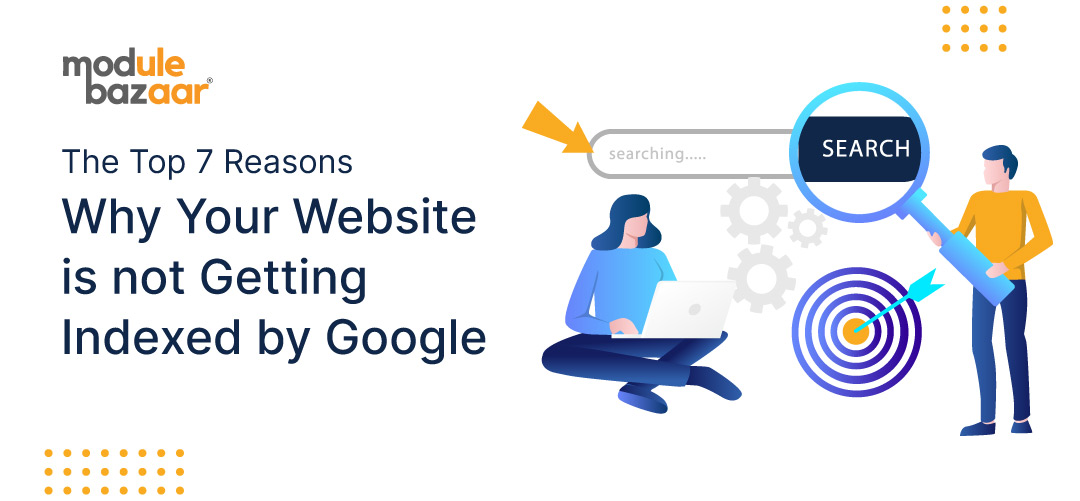Share the post "The Top 7 Reasons Why Your Website is not Getting Indexed by Google"
Google has made it clear that it doesn’t index every page you submit for ranking. Use Google Console to find the information about the reason Google did not index your web pages and suggestions on what can be done to improve your website ranking.
Why Website is not Getting Indexed by Google?
It can be because of the server error, duplicate content, or failure to comply with the latest Google ranking algorithm. So, which error is most likely causing the Google indexing issue for your website.
Let’s take a look at the most common reasons why your website is not getting indexed by Google.
- Content Quality
- Duplicate Content
- Crawl Budget
- Soft 404s
- Complex Coding
- Not Optimized for Technical SEO
- You are Using Wrong Plugins
1. Content Quality
Thin content, extremely biased work, content promoting hatred or abuse, and misleading work are a few common causes of Google not indexing your web pages. You shouldn’t be surprised if Google doesn’t index your content because it doesn’t meet the quality standard set by Google’s latest ranking algorithm.
Google is very strict about the websites and content it publishes on the search engine. It’s only normal for the company to not index your website if your content is not good quality-wise. It is important to focus on the quality of the content, as it not only helps in getting your website ranked, but it determines the user experience. The better the quality of your content, the higher your website will rank, the sooner it will get indexed.
2. Duplicate Content
Plagiarism is a big NO! Google will not index any page that’s copied straight from other sources. However, there are times when your website is tagged as plagiarized even when you haven’t posted any copied work. That error occurs because of the canonical tags pointing to multiple pages. As a result, your actual page does not get indexed.
It’s important to use a 301 redirect if you have duplicate content. Google does this to ensure that the similar pages on your website are not competing with each other for ranking. You should make sure that your content is not plagiarized, or if you are using the same content on multiple pages of your website, use the canonical tag or 301 redirects.
3. Crawl Budget
Google doesn’t index hundreds of thousands of pages on a website. It has a limit and based on that, Google bots will index the selected number of URLs for each website. Now, which web pages you’d like to get indexed is up to you. Make sure you use this opportunity wisely and index only the pages that are extremely important. Learn more about the crawl budget to get a better idea of whether the indexing is occurring because of the limited crawl budget.
4. Soft 404s
404 errors occur when you send a deleted or non-existing page to Google for indexing. It happens when you send a page for indexing and delete it shortly after that. Google bots can’t index a deleted page. Never redirect these deleted pages to random web pages that are totally irrelevant to your content. Similarly, if you have implemented multiple redirects for certain pages, you might encounter the soft 404 error. So, make sure you have a short and clear redirect chain.
Read Also: Are Your URLs Accessible to Search Engines?
5. Complex Coding
Another common reason why Google isn’t indexing your website is that you are using the coding language in a way that Google can’t understand. Whether it’s JavaScript or Python, you need to ensure that your language and settings are simple and updated. Old or outdated settings can cause complications in indexing your website. If coding is the reason why your site is not indexed, you should test your website on mobile-friendly testing tools to know whether or not your website is doing well in the search engine.
6. Not Optimized for Technical SEO
Technical SEO matters as much as off-page or on-page SEO. If your website takes too long to load, it goes without saying that Google won’t be able to index your web pages. There is a chance you have a slow-loading website because your site is filled with too much content or you are using the wrong server. Optimizing for technical SEO takes a lot more than improving the loading speed of your website. You need to follow Google’s latest core web vital algorithm update to ensure that your site gets indexed quickly and effortlessly. You can use Google page speed insights or tools like webpagetest.org to ensure that your technical SEO is good.
7. You are Using Wrong Plugins
Some plugins might stop Google bots from indexing your website, such as robot.txt. Check which plugins are currently active on your website and deactivate the ones causing problems with indexing.
From duplicate content to problems in the quality of the work, there can be many reasons why your website or certain pages are not getting indexed on Google. You can check out Google Search Console to get a list of the pages indexed and not indexed by Google.


